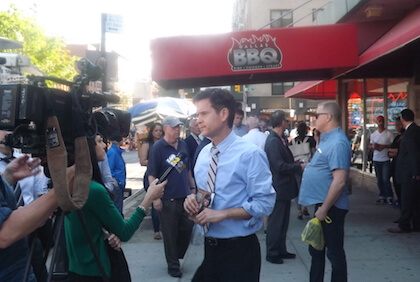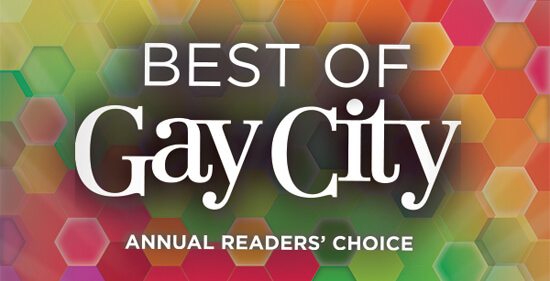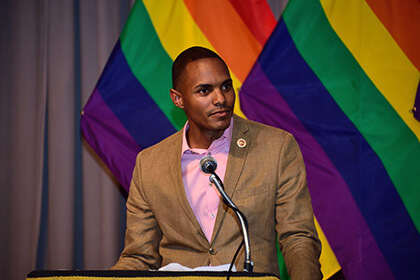Lost leases, rent increases, a shifting residential dynamic, and the influx of tourist and tech dollars are all playing their part in recasting the role of Eighth Avenue between 14th and 23rd Streets — the commercial spine of Chelsea.
But this is not simply a story about the ever-gentrification of Manhattan, it’s also another telling indicator of the decline of the neighborhood’s status dating back two decades as New York’s gayest neighborhood.
Business departures are another indicator of Chelsea’s decline as a global gay mecca
This past August, it was one last shower-drenched dance for the iconic go-go boys of Splash. When the club arrived on West 17th Street in 1991, it sparked a great gay migration and gave rise to dozens of nearby establishments catering to the Chelsea Boy life. Today, remaining gay-focused businesses on Eighth Avenue include three porn emporiums (Rainbow Station, the Blue DVD, and the Blue Store) and a handful of menswear shops (including the Starting Line and EFOR). Once thriving and now gone: the Service Station spa and the Big Cup coffee shop, as well as Food Bar and Viceroy restaurants. Rawhide and View are no more, making Gym the Avenue’s only gay bar.
Other telling indicators that his patch of Chelsea has surrendered the pull that made it a worldwide queer destination in the 1990s are the recent shuttering of the men’s clothing store Camouflage and the imminent departure of that mecca of gay tchotchke taste, Rainbows & Triangles, and of Arcadia Spa & Home.
These days, new arrivals on the boulevard — be they foot traffic or businesses — are more likely to sport corporate logos than Pride stickers. Of the 115 ground level properties from 14th to 23rd Streets, nearly a third are chain stores, franchises or banks. Starbucks has three locations, and Subway, GNC, and Chase two.
In a long period of transition occasioned by the increasing residential unaffordability of the neighborhood — leading to gay flight first to Hell’s Kitchen and then to a variety of neighborhoods in Brooklyn and Queens — it was last August’s unexpected closing of Splash that may have dealt a fatal blow to Eighth Avenues’s reputation as a shop, schmooze, and cruise destination.
Rainbow & Triangles
“In terms of loss,” said Rainbows & Triangles co-owner Steven Spiro, “Splash was more of a psychological departure. It represented a big anchor for the neighborhood. Now there’s less foot traffic, in general.”
The shift, he noted, has been a decade in the making.
“The whole dynamic has changed, all the way from Sixth Avenue to the West Side Highway,” Spiro said. People are older, he said of his regulars — 60 percent of them from the neighborhood — “and their spending habits are different.”
The decision to close stems from the new building owner’s refusal to offer a new lease, said Spiro, who added that he and his business partner, Fernan Royo, won’t retreat into cyberspace or look for another brick and mortar location.
“I have no regrets,” said the soon-to-turn-50 Spiro, “but I’m not sure the small business model works in today’s environment.”
He’s proud to claim a few notable markers in the cultural ebb and flow of Chelsea.
“We sold dance way before Virgin was in the US,” Spiro said, recalling when the store’s music collection made it “a gay destination, along with Splash and Roxy.”
Spiro and Royo also established a loyal customer base with their unapologetic stocking of poppers, leather, and lube — first in the US to carry Eros! — alongside Pride merchandise, refrigerator magnets, greeting cards, and coffee table books.
Customer Jimmy Lam, a 50-year-old immigrant from the Dominican Republic, who overheard Spiro speaking with this reporter, chimed in, “This is my favorite store, since I arrived in the states 23 years ago. It’s the place where I come to buy my gay identity paraphernalia.”
Although the store has no official closing date, it will likely remain open for another month or two, at the most.
“We’re running a closing sale,” Spiro said. “There will be a point where so much merchandise is gone that it won’t be worth it to open the door. That’s when we’ll be done. But we had a great run, with fantastic customers, friends, and stories. We went through the worst years of the AIDS crisis to the years of crystal addiction to seeing people enter into recovery.”
Affordability weighs heavily on Spiro’s mind.
“I see lots of empty places,” he said of casualties that couldn’t make the two- or three-fold rent increase — and although he acknowledged that access to free adult video online and changes in the music business have added to his margin pressures, Spiro said the deciding factor for many small businesses is the combined burden of real estate taxes, rent, and insurance.
“At the end of the day,” he noted, “you’re working for the landlord and the city.”
Arcadia Spa & Home
With an expected closing date of March 25, owner Jay Gurewitsch, a 20-year Chelsea resident, said Arcadia has “suffered in the same way as Camouflage and Rainbows & Triangles, from the one/ two punch of the Great Recession and the changes that have hit Chelsea over the last ten years.”
In 2011, Gurewitsch moved his store to 249 West 23rd Street, after six years on West 19th and five years in the former home of The Big Cup (now NY Lovely Nails & Spa). The expansion into the Big Cup space was intended, Gurewitsch said, “to serve a community that disappeared during the recession. But they never came back.”
During his years on Eighth Avenue, Gurewitsch learned firsthand “the real reason why independent retailers close up all the time, either once their lease is up or abruptly in the middle of their lease.” Gurewitsch’s lease obligated him to pay 50 percent of any increase in taxes over the base rate. With residential non-stabilized rents in the area greatly increasing “as more tech people moved in and more apartments were de-stabilized every year,” he explained, “the assessment on the building we were in skyrocketed. But the landlord had no interest in appealing it, because she doesn’t pay her tax bill.”
He acknowledged that “every apartment and retail space pays its fair share of the total real estate tax bill for the building, so the store’s share was a miniscule few hundred dollars per year, and my lease specifically includes a maximum cap in the increase in real estate taxes the building can pass along to me.” But insulation from “insane tax bills” weren’t enough to shield him from dynamics at work within his client base. First, there was the loss of core customers who, “while not rich, were ready to spend significant money — $100-500 — on a fairly regular basis for gifts for friends and family and for decorating their own homes.”
The newer tenants that have moved in over the past five years or so are also “far less tied to Chelsea as a distinct neighborhood and community.” Overwhelmingly young, these newer residents, he said, eye Chelsea more for the area’s central location in Manhattan than its gay identity or proximity to the galleries — and they’re more inclined to shop online. Unlike those who arrived decades ago, who bought into the housing market when it was cheap, new arrivals employed by Google and, soon, newly announced West 17th Street tenant Twitter, “fall into two very different and opposite categories: one, barely able to pay rent and keep food on their tables so all they can do is buy greeting cards —which don’t exactly pay Manhattan retail rent — or two, making so much money that, I kid you not, Arcadia is just not expensive enough for them. I have heard it repeatedly, especially in the last few years: ‘Your prices are too low.’”
After his brick and mortar days end in March, Gurewitsch plans to revamp his website (arcadianyc.com), eliminate shipping charges for some items, increase social media outreach, and “focus more tightly on those products Arcadia has that no one else sells.”
Camouflage
On Sunday, January 26, workers were wheeling out empty display cases and other final remnants from the store Norm Usiak founded with his business partner, Gene Chase, who died of AIDS in 1996. When Camouflage made its 1976 debut on the corner of Eighth Avenue and 17th Street, Usiak recalled, “What was so wonderful about Chelsea and the West Village was that it didn’t matter who you were. You were accepted. The whole area was an idea factory. It used to draw innovative young people who came to New York to start their careers. You had so many actors, writers, production designers, and theater people. Everybody was friendly, as long as you abided by the law and didn’t hurt anybody. In the ’70s, it [Eighth Avenue] was predominantly straight. I’m straight, Gene was gay, and we were best friends. We always said that Camouflage was a clothing store for men. We didn’t care what they were.”
Still, Usiak credited the influx of gay men into Chelsea with enhancing the store’s popularity, so much so that in 1987, a second store, Camouflage Downtown, was opened two doors down, meant to “represent a new look, of what everyone south of 23rd Street was wearing — a bit more tight-fitting, tailored shirts, no pleats. Back then, jeans were becoming acceptable to wear with the sports jacket.”
In August of 2013, Camouflage Downtown closed. On January 26, so did the original.
“I gave that [Downtown] up for the same reasons I am giving up this one up, which is rent increases,” said Usiak, who noted the monthly asking price for the corner store went from $7,000 to $24,000 — a decision made by the building’s new co-op board. “They really never gave me an explanation,” he said. “From what I’m told, the building needed more income and the only way they could get the income was increasing the retail rents or increasing their maintenance. I never had real estate taxes, but with the new lease, I would.”
The influx of tourists into Chelsea was among the key factors Usiak cited in talking about the upward pressure on rents.
“The High Line had a lot to do with that,” he argued. “When you bring in five to seven million tourists, the commercial landlords understand that means more people walking by their property. They calculate that as a reason why they’re raising the rent to these levels.”
Usiak, who turns 65 this year, said that rather than open at another location — at an estimated cost exceeding half a million dollars — he’d like to do some consulting work and maybe “teach young people about retail and how to stay alive for 38 years, which is very difficult when you don’t own your property. I’m disappointed that I’m leaving Chelsea, but to start a new business with the type of product I have, it’s just too expensive. My store is not the type you can put between a block. These [corner] windows have been my source of advertising.”
Right up to its final days, Usiak said, Camouflage remained a destination for “those who want to feel the fabric, and see the quality,” and would spend the necessary amount for a product that has stylistic staying power. “I wouldn’t sell clothes that you can’t wear five years from now,” he said, noting it wasn’t uncommon to hear from customers “who came here in the late ‘70s, who bought a beautiful Perry Ellis coat they still own.” He added, “The Twitter and Google people, they buy online.”





































